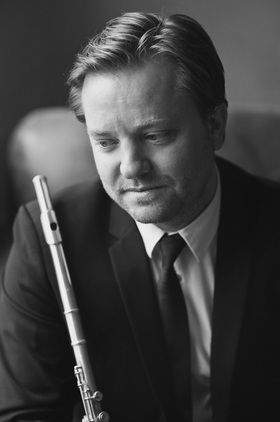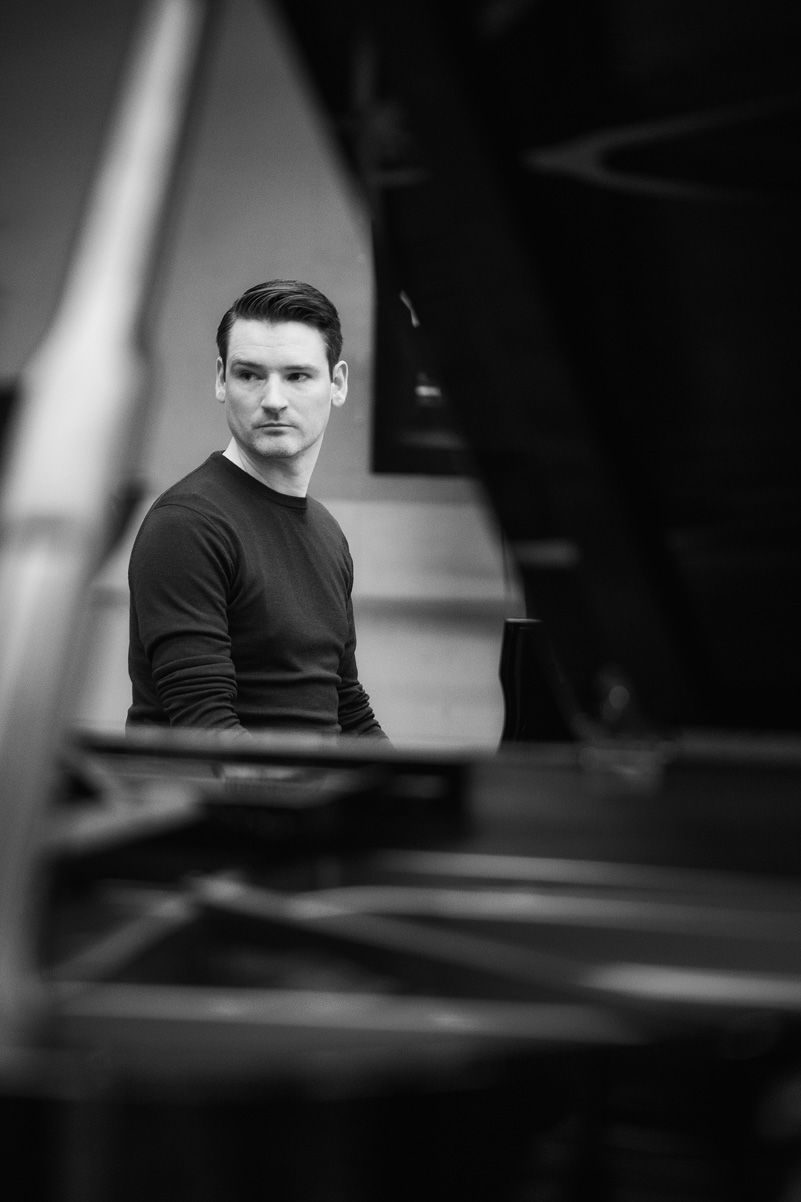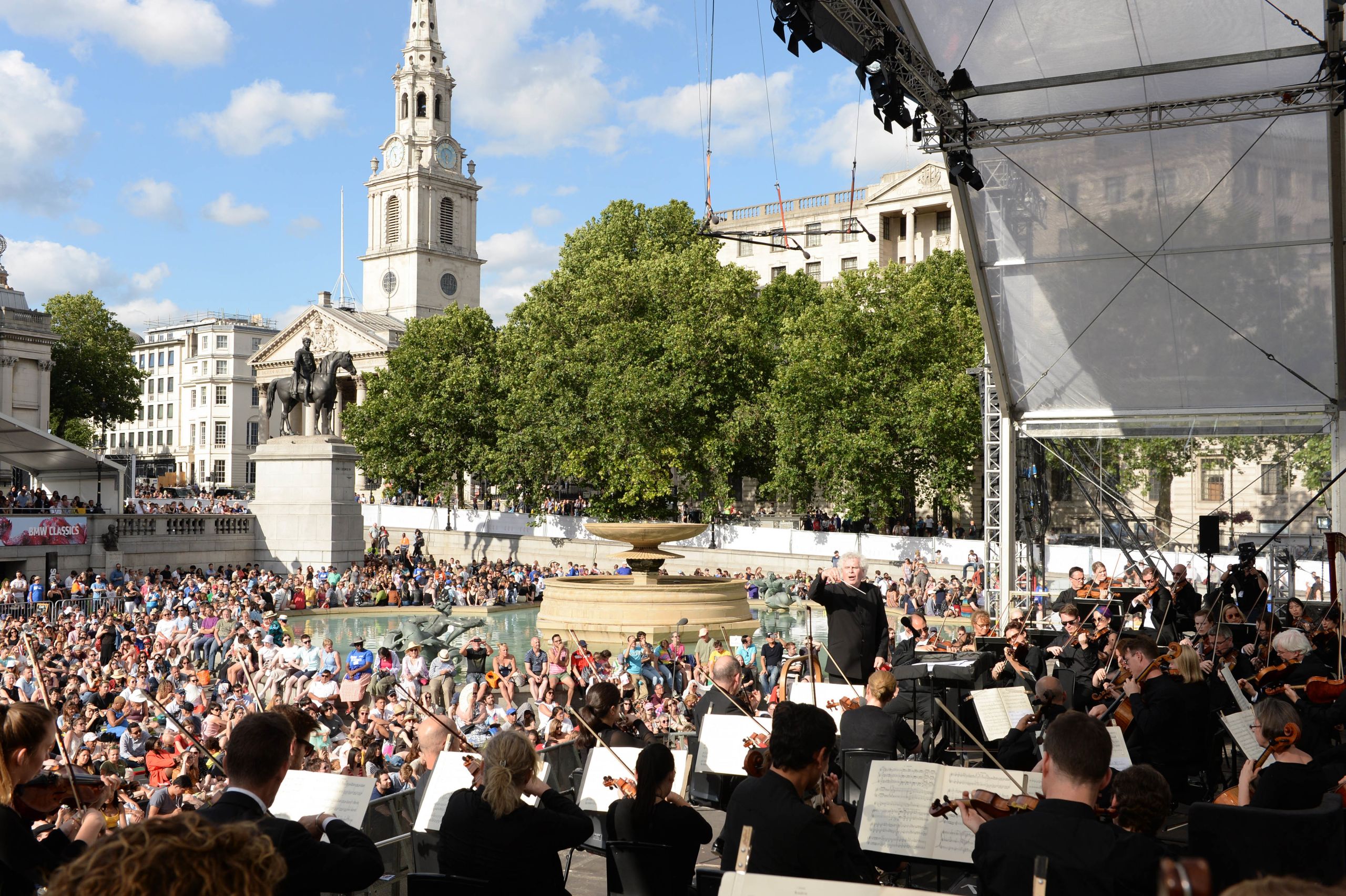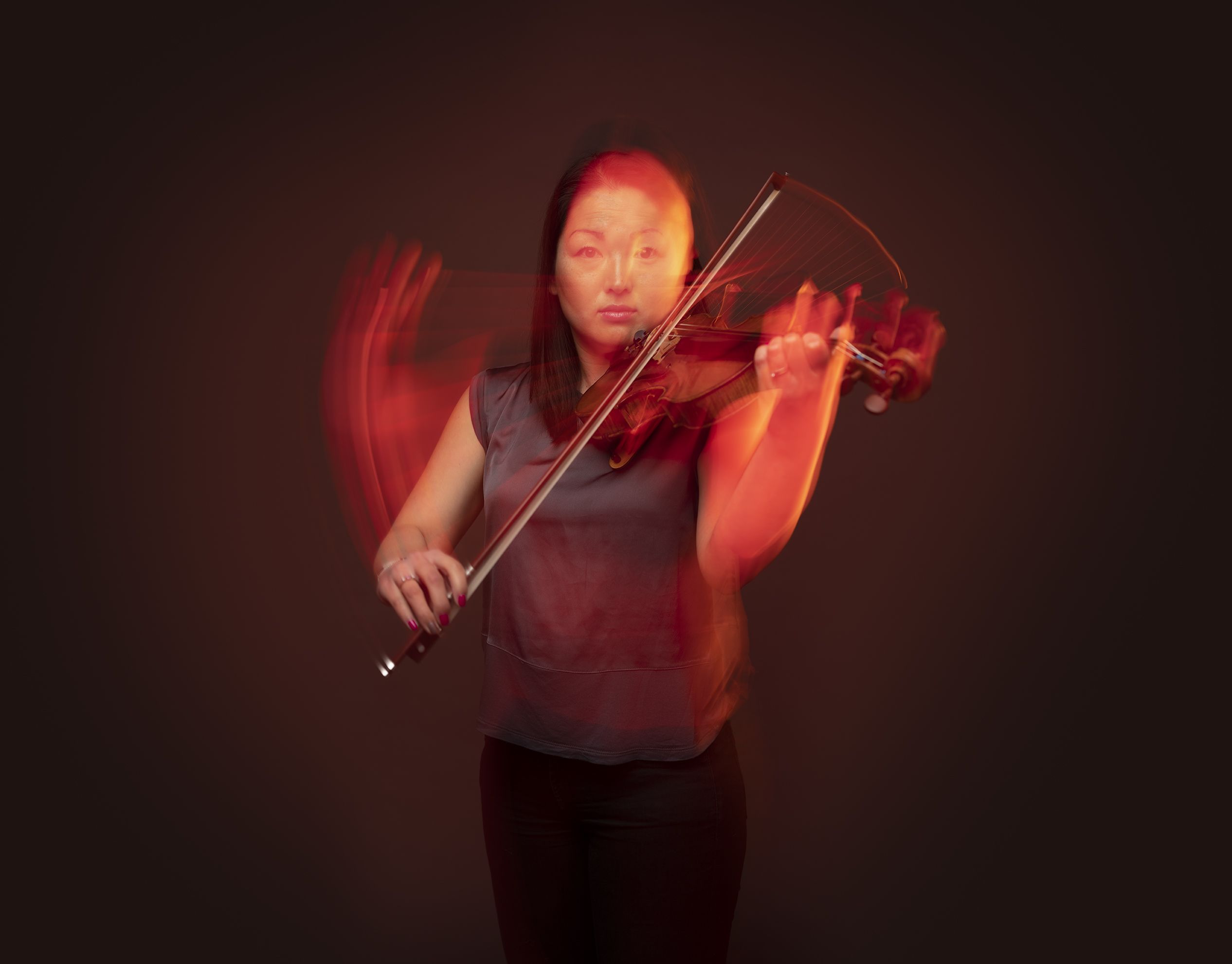LSO Summer Shorts
Gareth Davies & Michael McHale
13 August 2021

You can use your phone to read about the music and performers during the concert. Use the menu icon (≡) in the top right of the screen to navigate.

Free WiFi
There is free WiFi available in the Jerwood Hall. Connect to the 'hawksmoor' network.
Please Note
Phones should be switched to silent mode. We ask that you use your phone only for reading the notes during the music. Photography and audio/video recording are not permitted during the performance.
Today's Programme
Friday 13 August 2021 11am & 1pm
William Grant Still arr Alexa Still Three Songs for Flute and Piano
Electra Perivolaris Glen Sannox River Song
Carl Reinecke Undine Sonata
Gareth Davies flute
Michael McHale piano
This series of Summer Shorts concerts is made possible by the kind support of the Huo Family Foundation.
Today's 1pm concert will be live streamed at youtube.com/lso.
William Grant Still arr Alexa Still
Three Songs for Flute and Piano
✒️ 1944 to 1953 | ⏰ 10 minutes

1 Bayou Home
2 If You Should Go
3 Song For the Lonely
Along with nine operas and various choral works, William Grant Still composed some beautiful art songs. Three Songs for Flute and Piano are arrangements of three of these. In Bayou Home (1944) he sets a text by his wife Verna Arvey that expresses anticipatory nostalgia for the American South (bayous being the swampy creeks commonly found there). Grant Still’s love of American folk music is evident in the song’s catchy refrain: ‘I’m leaving my home on the Bayou … got to answer a call from afar’.
If You Should Go comes from the 1949 cycle Songs of Separation. The composer perfectly captures the dreamy tone of US poet Countee Cullen’s poem of the same name through his meditative music, which contains a hint of jazz in its harmonies. Song for the Lonely (1953) sets another text by his wife Arvey, this time about solitude. The falling phrases, simple melody line and slow tempo create a mood of melancholy resignation. Three Songs were arranged by New Zealand flautist Alexa Still, a great champion of Grant Still’s work.
Note by Kate Hopkins
William Grant Still
1895 to 1978
Long known as the 'Dean of African-American Classical Composers', as well as one of the US' foremost composers, William Grant Still has had the distinction of becoming a legend in his own lifetime. He was born in Woodville (Wilkinson County) Mississippi on 11 May 1895, to parents who were teachers and musicians.
Still wrote over 150 compositions (well over 200 if his lost early works could be counted), including operas, ballets, symphonies, chamber works and arrangements of folk themes, especially African-American spirituals, plus instrumental, choral and solo vocal works.
Recommended listening
William Grant Still Afro-American Symphony: IV. Lento con risolutione
Electra Perivolaris
Glen Sannox River Song
✒️ 2021 | ⏰5 minutes

Glen Sannox River Song was composer for LSO Soundhub, for a first performance by LSO Principal Flute, Gareth Davies.
This piece is influenced by the landscape and musical traditions of my home on the Scottish Isle of Arran. The structure of the piece follows the undulating shape of the Glen Sannox river which runs between the mountains in the North of Arran. The reinventions of the melodic lines trace the bends and curves in the river as it flows down from its high mountain source.
Glen Sannox River Song is a response to traditional Gaelic singing. Through the piece I experiment with the use of the voice of the flautist over played pitch. The played and sung lines of the flautist reflect the call and response dialogues in Gaelic Psalmody and Hebridean Waulking Songs, as well as the inflection and ornamentation in the voices of precentor and congregation. There is a process of growth through the piece, as the call and response textures become faster with increasing ornamentation and intensity. The central melodic line reinvents itself over these cycles of dialogue, moving between unison calls and the answering lines in the interweaving voices of the congregation.
The constancy of the flowing river and the endless cycles of melodic reinvention and transformation might bring new reflections from the natural surroundings of my home into the urban surroundings of LSO St Luke’s, as the area undergoes a process of reinvention, emerging out of the pandemic.
Note by Electra Perivolaris
Electra Perivolaris
b 1996
Described as a ‘Classical Star of the Future’ in a BBC Introducing article, Electra Perivolaris (b 1996) is a composer and pianist from Scotland of mixed British and Greek heritage.
Following success in the BBC Young Composers’ Competition 2014, Electra has had her music performed across the UK and internationally by musicians of the London Symphony Orchestra, BBC Scottish Symphony Orchestra, Hebrides Ensemble, BBC Singers, Scottish Chamber Orchestra and BBC Concert Orchestra. She is Ambassador for the BBC Young Composer Scheme and she is currently writing for the Scottish Chamber Orchestra as part of their New Stories scheme.
Carl Reinecke
Undine Sonata
✒️ 1882 | ⏰ 20 minutes

1 Allegro
2 Intermezzo: Allegretto vivace
3 Andante tranquillo
4 Finale: Allegro molto agitato ed appassionato, quasi presto
Carl Reinecke’s Undine Sonata is a musical retelling of Friedrich de la Motte Fouqué’s fairytale novella Undine (1811).
The water nymph Undine longs to experience human love. In the opening Allegro, with its virtuoso central section, she leaves her underwater kingdom for a new life on land. The nimble Intermezzo that follows depicts her romance with the knight Huldebrand, introduced in the first of the movement’s two trios by a stately piano solo. In the lyrical Andante tranquillo the couple rejoice in their initial marital happiness – though Undine’s water-goblin uncle briefly disturbs their peace with a warning of imminent danger.
This duly arrives in the fierce Finale, which opens with a tritone interval: the famous ‘devil in music’. Huldebrand rejects Undine, she falls into the Danube, and he, believing her dead, marries a mortal woman. The music is as turbulent as the characters’ emotions. Only at the end – after Undine has delivered the kiss of death to her faithless spouse – does it achieve calm.
Note by Kate Hopkins
Carl Reinecke
1824 to 1910 (Germany)

Carl Reinecke was a pianist, composer, conductor and teacher, who during his lifetime held positions as a professor at the Cologne Conservatory and as director of the Gewandhaus Orchestra, Leipzig.
As a performer he embarked on his first concert tour at the age of 19, and at 80 made recordings on piano roll, making him the earliest born pianist to have his playing preserved in any way.
He started composing from the age of just seven years old, and continued after retiring, resulting in almost 300 published works, the most famous of which is his Undine Sonata.
Artist Biographies

Gareth Davies
LSO Principal Flute
Gareth Davies is one of the flautists of his generation. He studied at the Guildhall School of Music & Drama and joined the Bournemouth Symphony Orchestra as Principal Flute after graduating. After five years on the south coast, he joined the London Symphony Orchestra where he has been Principal Flute for 21 years. He has recorded several solo works including the Nielsen, Karl Jenkins and Knehans concertos and can be heard on many LSO Live recordings including two versions of Debussy’s Prélude à l'après-midi d'un faune and Daphnis and Chloe. He appears on several of the Harry Potter and Star Wars soundtracks as well as many other film and TV shows.
He is in demand as a teacher around the world and is currently visiting professor at GSMD. Gareth is also in demand as a presenter and writer. He has written and presented programmes on Classic FM and BBC Radio 3 and has interviewed many people from the classical music world for broadcast including Sir Colin Davis, Valery Gergiev, Sir Simon Rattle and Thomas Adès.
His writing has featured in BBC Music Magazine and several newspapers, and his first book The Show Must Go On was a book of year in the Financial Times and Classical Music magazine.
He also writes education material for LSO Discovery to help introduce young people to classical music, including Game Over, Voyager and his pandemic-inspired digital project Where’s Simon, which is still available to watch online. His latest project for LSO Discovery, The Disappearance of Doctor Copernicus, will be performed in May 2022.
Gareth is a Wm S Haynes artist.
Michael McHale
piano
Belfast-born Michael McHale has established himself as one of Ireland’s leading pianists and has developed a busy international career as a solo recitalist, concerto soloist and chamber musician.
He has performed and recorded as a soloist with the Minnesota and Hallé Orchestras, the Moscow, Bournemouth, Jacksonville, Fort Smith, BBC and London Symphony Orchestras, City of London Sinfonia, London Mozart Players and all five of the major Irish orchestras, and performed at the Tanglewood and Tokyo Spring Festivals, Wigmore Hall, London, Berlin Konzerthaus, Lincoln Center, New York, Symphony Hall, Boston and Pesti Vigadó in Budapest.
Winner of the Terence Judd/Hallé Award in 2009, Michael was also awarded the Brennan and Field Prizes at the 2006 AXA Dublin International Piano Competition, the 2005 Camerata Ireland/Accenture Award, and in 2016 a Major Individual Award from the Arts Council of Northern Ireland. He studied at the Royal Irish Academy of Music, Cambridge University and the Royal Academy of Music, and his teachers and mentors include John O’Conor, Réamonn Keary, Christopher Elton, Ronan O’Hora and Barry Douglas.
In 2017 Michael was invited to become a Patron of the Ulster Youth Orchestra, and in 2018 he was appointed lecturer in piano for undergraduate and postgraduate students at the MTU Cork School of Music in Ireland.
Michael collaborates regularly with Sir James Galway, Michael Collins, Patricia Rozario, Dame Felicity Lott and Camerata Pacifica.
Thank You for Watching
The London Symphony Orchestra was established in 1904. Through inspiring music, educational programmes and technological innovations, the LSO’s reach extends far beyond the concert hall.
Still to Come this Summer

BMW Classics 2021
Sunday 15 August 6.30pm, Trafalgar Square & online
After a year away, BMW Classics is back, transforming one of London's most iconic landmarks into a giant, open-air music hall. Free for everyone to enjoy, in person or online.
Next Friday:
Naoko Keatley & Zeynep Özsuca
Friday 20 August 11am & 1pm, LSO St Luke's
LSO Second Violin Naoko Keatley and pianist Zeynep Özsuca perform together for the third concert of our Summer Shorts 2021 series
Tickets: Pay what you can, available now
Support the LSO and LSO St Luke's
The importance of music and the arts has never been more apparent than in recent months, as we’ve been inspired, comforted and entertained throughout this unprecedented period.
As we emerge from the most challenging period of a generation, please consider supporting our Always Playing Appeal to sustain the Orchestra and our venue LSO St Luke's, assist our recovery from the pandemic and allow us to continue sharing music with the broadest range of people possible.
Every donation will help to support our future.
You can also donate now via text.
Text LSOAPPEAL 5, LSOAPPEAL 10 or LSOAPPEAL 20 to 70085 to donate £5, £10 or £20.
Texts cost £5, £10 or £20 plus one standard rate message and you’ll be opting in to hear more about our work and fundraising via telephone and SMS. If you’d like to give but do not wish to receive marketing communications, text LSOAPPEALNOINFO 5, 10 or 20 to 70085. UK numbers only.






